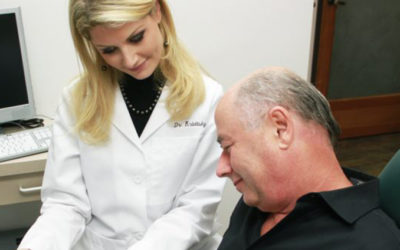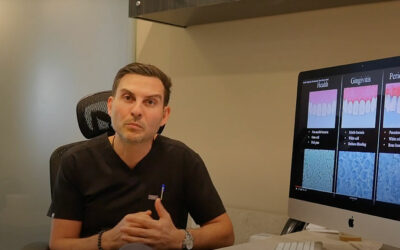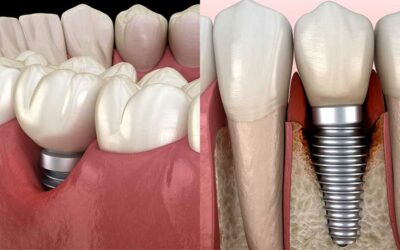What Is Scale & Root Planing?
For Los Angeles residents living with periodontal disease (gum disease), a scaling and root planing procedure may be the only option to get their oral health back on track. This “deep cleaning,” as many refer to it, removes the infectious bacteria deep inside periodontal pockets that are responsible for bone and tooth loss.
Deep Cleaning vs. Regular Cleanings
A traditional teeth cleaning is preventative by design. It is used to stop the onset of gum disease and reverse minor issues like gingivitis. But as a prophylactic procedure, these routine cleanings are meant for good oral health maintenance, as opposed to treating chronic periodontitis.
Traditionally, these dental cleanings are scheduled about once every six months. Combined with good brushing, flossing, and antimicrobial mouth rinse, most people do just fine.
But sometimes, time gets ahead of us, or we don’t floss like we should. When there is soft tissue or bone attachment loss, a preventative cleaning is no longer appropriate. As gum disease develops, a much more thorough and deep cleaning is required to remove the calcified bacteria responsible for the infection. We call this scaling and root planing, but some people refer to it as a deep cleaning. They are both one and the same.
Scaling and root planing is a nonsurgical treatment for people with gum disease. Combined with good oral hygiene, the goal is to have the gums reattach to the tooth surfaces or halt the progression of the tissue detachment. Unlike preventative cleanings, scaling and root planing target buildup across the root surface and inside of periodontal pockets.
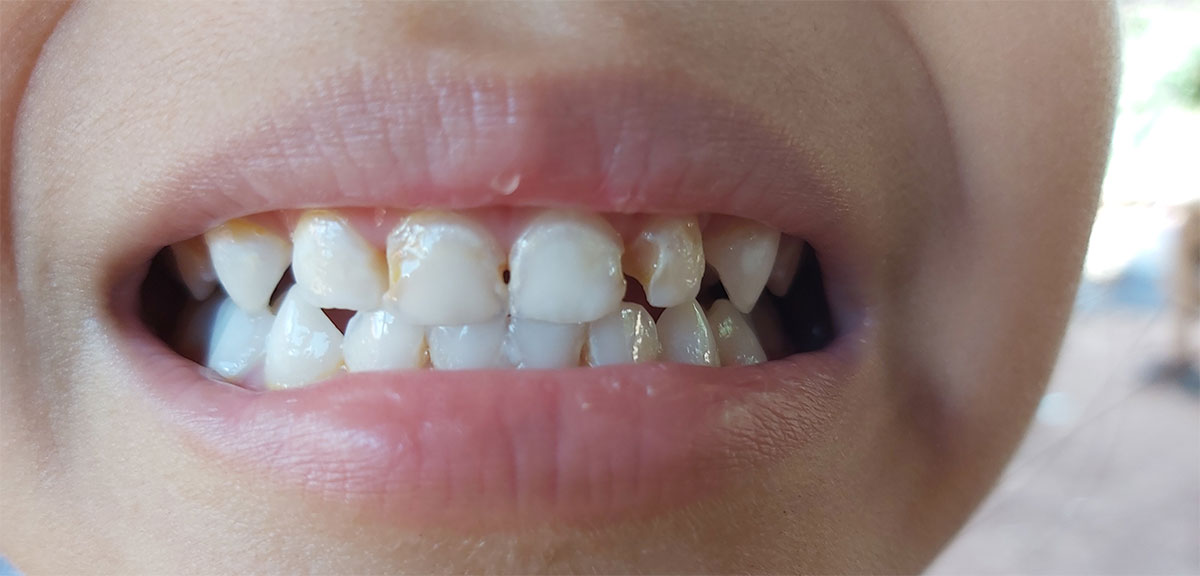
Image Above – The patient requires a scaling and root planing procedure to remove plaque and tartar buildup on the teeth surface and the roots below the gum line.
What are Periodontal Pockets?
People with severe periodontitis have infections deep below their gum tissue, which then causes the gums to detach or pull away from their tooth roots. As this happens, the bone surrounding the tooth roots also deteriorates. Little by little, “pockets” are created between the tooth and gum tissue that gradually deepen over time.
The more severe a periodontal pocket is, the higher the risk for tooth mobility and loss. Regular brushing and flossing cannot clean these areas, so without a deep cleaning, the infected tooth will only get worse. Left untreated, the early stages of pocketing will progress into more advanced periodontal disease. At that point, additional treatment like root planing is the only way to avoid future tooth loss.
Who Performs Deep Cleaning Procedures?
Per the American Dental Association, a licensed dentist or dental hygienist can perform a root planing scaling procedure. This minimally-invasive therapy can only be performed by licensed dental professionals. But even dental tools have their limits. If your gum disease is in an advanced state, you will need to see a periodontist. At the Center for Advanced Periodontal & Implant Therapy, we have resources and additional expertise in periodontal health. So if a dental scaling and root planing or nonsurgical treatment aren’t enough, our specialists can help.
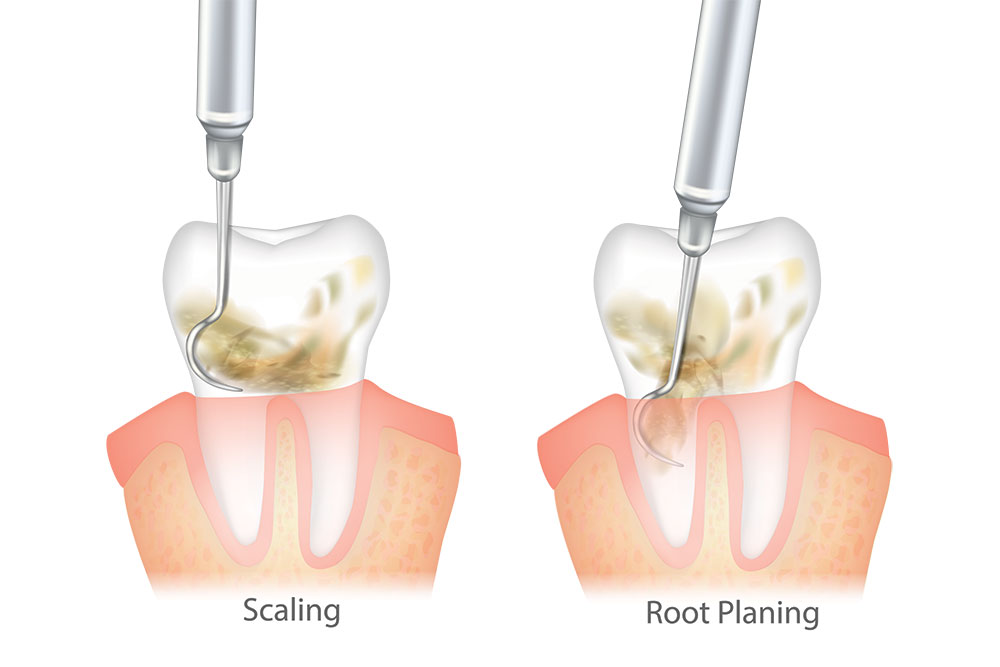
Root Planing Procedures: What to Expect
Most scaling and root planing appointments are completed with local anesthetic (numbing medication) to ensure your complete comfort. First, we apply a gel to desensitize the gum tissue where the local anesthesia is injected. After the anesthetic takes effect, we use special tools and ultrasonic devices to safely reach down below the gum tissue where deep pockets have developed.
In most cases, ultrasonic instruments are used. These special devices irrigate the periodontal pockets as they make thousands of tiny vibrations, loosening the bacterial colonies inside of the periodontal pocket. Occasionally, we will need to retract the soft tissues to perform root planing. The goal is to create a completely clean environment so that the gums reattach and bone loss is halted. We want to preserve all remaining supporting bone by eliminating the tartar deposits under your gum tissue.
Depending on how many teeth require root planing, we may recommend scaling your entire mouth or booking more than one appointment, cleaning half at one side and half at the next. Most root planing appointments take about 1.5 hours per side, so it’s easier on our patients to break the process up as opposed to one full mouth disinfection. We then see you for a dental visit a couple of weeks later to complete the root planing process.
Why Clean Below the Gum Line?
Your teeth rely on healthy gum tissue and bone surrounding your tooth roots to keep them intact. If bacterial plaque or tartar accumulates below the gums, they cause infection, bone loss, tissue detachment, and eventually, tooth mobility. Cleaning above the gums only may make your smile look cleaner, but it will not address the root cause of tooth loss and bad breath.
When we clean below the gum line where bacteria are heaviest, we reduce the risk to the infected tooth, prevent periodontal disease from spreading to adjacent teeth, stop the cycle of bone loss, and boost your immune system.
Scaling and Root Planing Benefit Your Overall Health
Active periodontal disease increases your risk of heart disease, heart attack, stroke, high blood pressure, diabetes, infertility, preeclampsia, erectile dysfunction, pneumonia, and more. When these infectious bacteria are removed from your root surfaces, the disease process cannot spread into your cardiovascular system through bleeding gum tissue. Not only is your mouth healthy as a result, but your immune system will also benefit.
Extensive research shows that people with co-existing medical conditions tend to see an improvement in their wellness within 3-4 months after a periodontal scaling and improved oral hygiene.
Periodontal Disease Treatment in Los Angeles
The Center for Advanced Periodontal & Implant Therapy offers comprehensive periodontal scaling and root planing, gum disease therapies, and treatments for chronic periodontitis. If you’ve been told that your gum disease is beyond treating at a traditional dental practice, our gum specialists can help.
Patients can contact us directly or ask their current dentist for a referral. But the sooner we address your periodontal disease, the higher the chances are of saving your natural smile.
Contact our Los Angeles periodontal and dental hygiene specialists today for a scaling and root planing appointment.
You May Also Like...
Senior Periodontal Care and the Challenges Aging Presents
As we journey through the stages of life, there's one aspect that demands consistent consideration — our oral health....
Revolutionizing Gum Disease Treatment: A Non-Surgical Approach to Healing at the Microscopic Level
Gum disease is a widespread oral health issue that affects millions of people around the world. Left untreated can...
How To Prevent An Infection After Getting Dental Implants
One of the leading causes of implant failure and dental implant infections is inadequate home care. Fortunately,...

